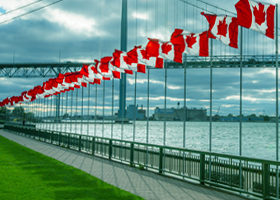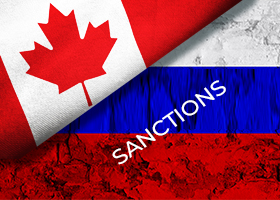


Canada Expands Sanctions on Russia and Proposes Broad Legislative Changes to its Sanctions Regime
Canada Expands Sanctions on Russia and Proposes Broad Legislative Changes to its Sanctions Regime
Below we provide an overview of two further rounds of Canadian sanctions against Russia as well as amendments that would significantly strengthen Canada’s sanctions regime.
Sanctions Restricting Trade with Russia
On May 18, 2022, Canada amended the Special Economic Measures (Russia) Regulations (the “Regulations”) [1] to further restrict exports and imports by:[2]
- prohibiting the export to Russia of various luxury goods, including alcoholic beverages, tobacco, certain textiles and sportswear, footwear, luxury clothing and accessories, jewelry, kitchenware, and art;[3]
- prohibiting the import from Russia of alcoholic beverages, seafood, fish and non-industrial diamonds;[4] and
- prohibiting the export to Russia of a wide spectrum of goods that could be used by the Russian military, including motor vehicles, tractors and tanks, and including such varied items as drones, concrete or mortar mixers, thermostats, x-ray machines and medical furniture, among others.[5]
The new import and export restrictions, which commence 60 days after they come into force, will apply to substantial trade flows, with trade in the targeted luxury goods estimated to be worth $75.7 million in 2021.[6] Moreover, these restrictions align with similar bans announced by the United States, the European Union and the United Kingdom.[7] These coordinated efforts reinforce the impact of targeted trade restrictions, although Russia will continue to be able to export and import such products through trading relationships in Asia and elsewhere.
Sanctions against Russian Persons
The May 18th amendments added 14 names to the list of sanctioned individuals, including Russian oligarchs, their family members, and close associates of the Putin regime.
On May 27, 2022, Canada designated another 22 individuals and four entities on its list of sanctioned persons, all of whom are bank officials (or their family members) or financial institutions.[8]
These changes are the latest in a series of sanctions dating back to Russia’s occupation of Crimea in 2014 (see our previous 2022 bulletins here, here, and here). Canada now imposes sanctions on more than 1,000 individuals and entities from Russia, Ukraine and Belarus. Canadians anywhere in the world (and any other persons in Canada) need to ensure that they are complying with the dealings prohibitions and disclosure obligations applicable to this lengthy list, which could continue to grow.
Proposed Expansion of Canada’s Sanctions Regime
Bill C-19 (the “Budget Implementation Act, 2022”), would make important changes to Canada’s core economic sanctions law, the Special Economic Measures Act,[9] as well as the Justice for Victims of Corrupt Foreign Officials Act (Sergei Magnitsky Law).[10]
New Property Seizure Powers
The amendments would expand Canada’s powers with respect to the seizure of property through the following additions:
- A broader definition of property that would include any type of property, whether real or personal or immovable or movable, or tangible or intangible or corporeal or incorporeal, and includes money, funds, currency, digital assets and virtual currency.
- The power to seize or “restrain” property that is owned, held or controlled, “directly or indirectly”, by or on behalf of certain persons.
- Enhanced enforcement powers of the Minister that would include the sharing of information and compelled disclosure. Specifically, the Minister would be permitted to collect and share information with several other government entities (including the Canadian Security Intelligence Service, the RCMP (Canada’s national police force) and the Canada Border Services Agency). The RCMP would also have a new role to assist the Minister in matters related to the making of a forfeiture order and the seizure and restraint of property.
- The power of the Minister to apply to the Court for forfeiture of seized property and a requirement that the judge order the property to be forfeited if it meets applicable criteria.
The proposed definition of property would explicitly acknowledge intangible and incorporeal assets, as well as digital assets and virtual currencies, clarifying that these assets are within the scope of Canada’s sanctions regime and could be seized.[11] Moreover, the inclusion of property that is under direct and indirect control of certain persons may significantly broaden the prohibition – and Canada’s powers – when compared to property that is simply “held by” those persons directly. Coupled with an expanded enforcement toolkit, these changes suggest that Canadian sanctions are evolving in ways that attempt to give them more bite – and make them more effective.
Other Important Changes
The amendments would also address the disposal of seized property, the issuance of general permits, and remedies for persons whose property has been seized through the following additions:
- A requirement that any amounts paid out of the proceeds of seized property be for the purposes of (i) the reconstruction of a foreign state adversely affected by a grave breach of international peace and security; (ii) the restoration of international peace and security; and (iii) the compensation of victims of a grave breach of international peace and security, gross and systematic human rights violations or acts of significant corruption.
- A new power allowing the Minister to enter into agreements with foreign governments respecting the use by the foreign state of amount that may be paid out of the proceeds of seized property.
- An expanded list of costs that can be recovered by Canada to include disposal of forfeited property, in addition to costs incurred in relation to the seizure or restraint of the property.
- Clarification of the Minister’s power to issue “general permits” allowing any person in Canada or Canadian outside Canada to carry out a specified activity or transaction, or class of activity or transaction, that is otherwise restricted or prohibited under the act.
- The ability of persons whose property is subject to a seizure or restraint order to apply to request that the order cease.
Ensuring that the proceeds of forfeited property are repurposed for the reconstruction of foreign states and compensation of victims would add a novel aspect to Canada’s sanctions regime, one that focuses on amelioration rather than solely prohibitions and punishment of offences. The power of the Minister to enter into agreements with foreign states for this purpose would help operationalize the achievement of these objectives.
Moreover, the ability to issue general permits could also be significant. This power is used effectively by OFAC in the United States to improve the clarity and administration of complex sanctions. The more frequent use of general permits would enable Global Affairs Canada to address situations that are determined to warrant exceptions in an efficient, transparent and non-discriminatory manner.
Parallel Changes to Canada’s Magnitsky Laws
The Budget Implementation Act, 2022 also contains largely parallel changes to the Justice for Victims of Corrupt Foreign Officials Act. The most notable difference, consistent with the more targeted purpose of Magnitsky laws, is that the proceeds of forfeited property would only be paid out for the compensation of victims rather than the reconstruction of a foreign state or restoration of peace and security.
Significance of the Proposed Changes
The amendments proposed in the Budget Implementation Act, 2022 have three broad implications:
- They expand the kinds of property and the linkages to designated persons that will be subject to prohibitions and seizures. Reference to tangible and intangible property that is owned, held, or controlled—directly or indirectly—by sanctioned persons is very broad and will require much more vigilant compliance programs to be implemented by Canadians who may have such dealings or come into possession of such property.
- They sharpen the enforcement tools and mechanisms, including through information sharing between government entities within Canada and abroad as well as the role of the RCMP in seizing assets.
- They demonstrate an overt turn towards reconstruction and compensation, emphasizing the Government’s commitment to both the political and economic policy objectives underlying the use of sanctions.
McMillan’s International Trade Group actively monitors sanctions measures related to Russia, Belarus, Ukraine and other jurisdictions, as well as the implementation of amendments to Canada’s sanctions regime, and is available to help businesses ensure compliance with these changing rules.
[1] Regulations Amending the Special Economic Measures (Russia) Regulations (SOR/2022-102), amending SOR/2014-58.
[2] For prior import and export restrictions, see for example Section 3.5 (Petroleum) and Section 3.6 (Restricted Goods) of the Regulations.
[3] Part 1 to Schedule 6 of the Regulations.
[4] Part 2 to Schedule 6 of the Regulations.
[5] Schedule 7 of the Regulations.
[6] Global Affairs Canada, “Canada imposes additional sanctions on Russian oligarchs in response to Putin’s continued aggression on Ukraine” (May 20, 2022).
[7] For the US trade restrictions on luxury goods, see Executive Order 14068; for the EU restrictions, see Council Regulation (EU) 2022/428; for the UK restrictions, see UK Government Press Release, “UK announces new economic sanctions against Russia” (March 15, 2022).
[8] Regulations Amending the Special Economic Measures (Russia) Regulations (SOR/2022-117).
[9] SC 1992, c 17.
[10] SC 2017, c 21.
[11] Similarly, the European Commission clarified in March that the concept of “transferable securities” in European sanctions regime also extends to crypto-assets. See European Commission, “Ukraine: EU agrees to extend the scope of sanctions on Russia and Belarus” (March 9, 2022).
by Neil Campbell, William Pellerin, Philip Kariam, and Yazhi Zheng, Summer Law Student
A Cautionary Note
The foregoing provides only an overview and does not constitute legal advice. Readers are cautioned against making any decisions based on this material alone. Rather, specific legal advice should be obtained.
© McMillan LLP 2022
Insights (3 Posts)View More
Canada Strengthens Its Economic Sanctions and Export Controls Against Russia and Supports Russia’s Removal from SWIFT
On February 24, 2022, Canada imposed additional sanctions in response to military actions taken by Russia against Ukraine. The Regulations Amending the Special Economic Measures (Ukraine) Regulations[1] and the Regulations Amending the Special Economic Measures (Russia) Regulations[2] came into force immediately on their day of publication.
Canada Ratchets Up its Sanctions in Response to the Russia-Ukraine Crisis
An update on Canada’s sanctions measures in response to military actions taken by Russia against Ukraine.
Canada Further Expands its Sanctions Regime Against Russia
An update on Canada’s sanctions measures in response to military actions taken by Russia against Ukraine.
Get updates delivered right to your inbox. You can unsubscribe at any time.




